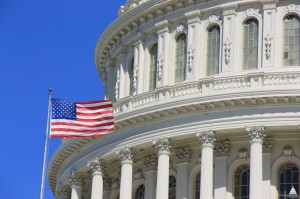Official Washington’s “conventional wisdom” is a pernicious fact of life in the U.S. capital as various presumed realities reverberate through the echo chamber of policymakers and journalists. Conventional wisdom is especially dangerous when what-everybody-knows-is-true isn’t, as ex-CIA analyst Paul R. Pillar explains.
By Paul R. Pillar
The lead article in the current International Security, by Alastair Iain Johnston of Harvard, addresses the now firmly entrenched idea that over the past two or three years China has become markedly more assertive in its relations with other countries than it was previously.
That China is “newly assertive” has become so broadly and automatically accepted that it gets expressed often enough to have become a cliché. “Newly assertive” is a descriptor that routinely gets inserted before “China,” just as easily as “long-suffering” routinely gets inserted before “Chicago Cubs fans.”

An American flag flying next to the dome of the U.S. Capitol. (Photo credit: Architect of the Capitol)
Johnston closely examines the evidence for the supposed new assertiveness and finds it wanting. The notion of new assertiveness by Beijing overstates actual change in Chinese policy and overlooks the complexity of the issues on which the assertiveness has been perceived.
Johnston sees maritime disputes as the only area where one could make a case for increased Chinese assertiveness. On other matters over the past couple of years, China’s policy has not changed, has become more moderate, or has been an understandable response to changes in conditions that Chinese policymakers face.
Johnston’s article has applicability that goes beyond China; he discusses the process of how such conventional wisdom comes into being even when the original empirical foundation for it is weak. He sees it in large part as a process of traditional journalism and the blogosphere playing off each other.
A more general and more widely descriptive observation would be that it is a process of certain propositions acquiring acceptance simply as a result of frequently being voiced by others. Because acceptance for this reason means the proposition gets expressed even more times by even more voices, we have the ingredients of a self-sustaining chain reaction. Politicians as well as journalists and the blogosphere all play in the chain reaction.
One can think of other notions with current policy relevance that are sustained by similar chain reactions. This is true of much conventional wisdom about Iran, for example, starting with the idea that Iran is definitely seeking to build nuclear weapons. Note how often one sees reference to Iran’s “nuclear weapons program,” even though that label is a misnomer.
Another example is the usual description of the Palestinian movement Hamas as “dedicated to the destruction of Israel” or some similar formulation, despite the ample evidence of the actual objectives of Hamas leaders that shows that to be a mischaracterization as well.
The phenomenon at hand is not just a matter of there being many important issues on which people disagree, with people on one side of the issue having a more popular view than those of the other side. Naturally people who have studied a particular issue in depth will be especially annoyed by what they regard as widely mistaken beliefs on that same issue. Johnston singled out the notion of new Chinese assertiveness because he is a China specialist who studies Beijing’s policies and behavior and understandably has his own well-formed views on that subject.
But when a notion achieves the status of conventional wisdom, a qualitatively different phenomenon arises. It is no longer just a matter of one view outvoting another view, but instead one of the self-sustaining chain reaction. The conventional wisdom acquires a life of its own, ever more divorced from whatever empirical reality may have been the original basis for it.
The damage of this type of conventional wisdom goes well beyond the irritation that comes from any cliché. Conventional wisdom constrains policy choices. More specifically, conventional wisdom that entrenches a negative view of another international actor promotes policies that risk becoming self-fulfilling prophecies of the most destructive sort. Security dilemmas arise.
A belief that the other side is obstreperous or difficult encourages policies toward that side that make it more likely it will respond in a way that really is obstreperous or difficult.
Paul R. Pillar, in his 28 years at the Central Intelligence Agency, rose to be one of the agency’s top analysts. He is now a visiting professor at Georgetown University for security studies. (This article first appeared as a blog post at The National Interest’s Web site. Reprinted with author’s permission.)

Is ” Pro-war intellectual” an oxymoron as is perhaps “US Democracy in Foreign Policy” ?
.
This is YET ANOTHER colossal bad result for US integrity and History.
.
Oh the fear … that unbearable fear that the scandalous information might reflect badly on a U.S. government or as
“that other great American” (Clark Clifford ) said †it would be inimical to our country’s interests.â€
.
Meanwhile Johnson said ” this is treason”….BUT…. kept it secret.
.
Brush another four years at the loss of 20,000 more U.S. troops and possibly a million more Vietnamese under the carpet.
.